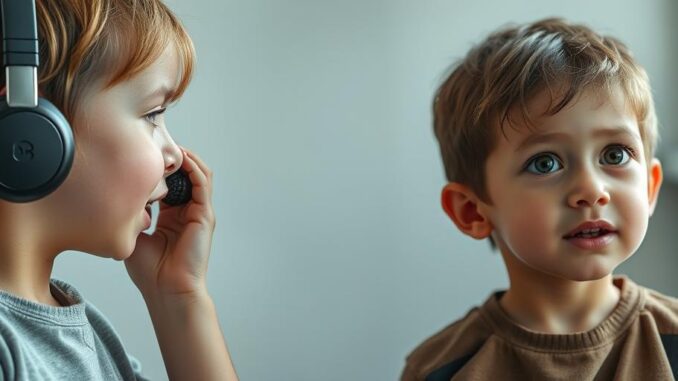
Summary
The American Academy of Pediatrics (AAP) is raising concerns about the pervasive issue of excessive noise exposure and its detrimental effects on children’s hearing and overall well-being. From earbuds to environmental noise, the AAP emphasizes the cumulative impact of noise throughout a child’s life and offers practical guidance for parents and caregivers to mitigate these risks. Protecting young ears is crucial for healthy development and a brighter future.
Stress-free data management TrueNAS is healthcares trusted solution for compliant data management.
** Main Story**
Okay, so the American Academy of Pediatrics (AAP) is really hammering home something important: noise pollution isn’t just an adult problem. It’s hitting kids hard, and we might not even realize how bad it is. You see, it’s not just about concerts being loud, it’s that constant hum of noise in our lives that’s slowly chipping away at their hearing. The AAP is pretty clear, those effects? They build up, meaning even ‘moderate’ sounds, over time, can do real damage to a kid’s ears.
Everyday Noise: A Hidden Culprit
It’s easy to point fingers at fireworks. But, honestly, a lot of the danger is sneakier. Think about it: earbuds cranked up to drown out the school bus din, baby sleep machines turned up way too loud, or even just a really noisy restaurant. I remember once being at a birthday party, and the noise level was actually painful! I can’t imagine what that was doing to the little ones. It’s a constant barrage, and kids are especially vulnerable.
More Than Just Hearing Loss
Now, you might think, “Okay, so they lose a little hearing, big deal.” But it’s way more than that. We’re talking about potential long-term problems like tinnitus, that constant ringing in the ears, or even hyperacusis, where normal sounds feel incredibly loud and painful, which is pretty awful. And, honestly, it doesn’t stop there. Studies are now showing links between noise exposure and sleep problems, stress, and even cognitive development issues. Like, imagine trying to concentrate in class when your ears are constantly buzzing. I wouldn’t be able to do it, not at all.
To be clear, the potential issues are:
- Hearing Loss: The obvious one, damage to those delicate ear cells. Even a slight loss can mess with speech and language skills, and, what’s worse, school performance.
- Tinnitus and Hyperacusis: That awful ringing, or super sensitivity to sound, that can be really disruptive to their daily lives.
- Stress and Sleep: Noise pumps up stress hormones and messes with sleep, affecting their general well-being.
- Cognitive problems: Difficulty concentrating, trouble with memory, and even problems reading. It’s not good, not at all.
Shielding Young Ears: A Few Easy Wins
So, what can we do? Well, the AAP has some pretty straightforward advice that’s pretty easy to implement at home and when you are out.
At Home:
- Turn it Down: Seriously, keep the TV and music at a reasonable level. A good way to judge is if you can talk to someone without yelling from just an arm’s length away.
- Cut Back on Screen Time: Too much screen time often means too much loud noise. Encourage them to read, play outside, or do something creative. It will help more than you realize.
- Sleep Machines, Used Carefully: If you’re using one for your baby, keep it on the lowest setting and put it as far from the crib as possible. Don’t leave it on all night, either.
- Quieter Toys: Choose toys that aren’t ear-splittingly loud. And if they are, maybe consider removing the batteries (shhh!).
- Create Quiet Zones: Make sure there’s a space in your home where they can go to escape the noise and just chill out. It’s important, trust me.
On the Go:
- Headphone Patrol: Keep an eye on how loud they’re listening to music and encourage lower volumes. Maybe invest in noise-canceling headphones so they don’t have to crank it up to block out the background noise, that said, don’t let them get too noise canceling, you do want them to be aware of their surroundings, after all.
- Loud Events: If you can, avoid taking them to super loud concerts or sporting events. And if you have to go, make sure they’ve got hearing protection.
- Be Aware of the Environment: Try to avoid noisy traffic or construction zones when you can.
Honestly, it all boils down to being more mindful of the soundscape we’re creating for our kids.
The Bigger Picture
The AAP is really pushing for us to raise awareness about this issue. Because the more people who know about it, the more we can do to protect our kids. From parents to teachers to doctors, we all need to be on board with creating a quieter, healthier world for the next generation. And that’s something worth fighting for, don’t you think?


The long-term impacts of noise exposure on cognitive development are significant. Beyond the home, how can schools and community spaces be designed or adapted to mitigate noise pollution and foster better learning environments for children?